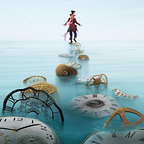My defense of Tim Burton’s Alice in Wonderland
Alice in Wonderland is, positively, Tim Burton’s most underrated movie.
I was replaying the Wii video game the other day (a delightful game, by the way) and I realized once more the risks the filmmaker took with Alice, much like he did before with other literary adaptations like Batman and Charlie and the Chocolate Factory.
Burton somehow knew he couldn’t do just another literal Alice movie adaptation. Instead, he focused on the true nature of dreams, and the American McGee-inspired screenplay, and then dedicated himself to build a Wonderland like we never saw before, only a glimpse of it in Paramount’s classic pre-Code version. A digitally-rendered Wonderland, based on the look of Arthur Rackham’s iconic fairy tale illustrations (Burton’s Wonderland looks much more like Rackham’s than John Tenniel’s), with a plot inspired by The Wizard of Oz, Sleeping Beauty and The Chronicles of Narnia. (Let us not forget C. S. Lewis would have never been the fantasy titan he was had it not been for Alice and the other works of Lewis Carroll and George MacDonald, the founding fathers of modern English Fantasy).
To top it all, Burton could obviously not resist the urge to throw in his old friend Johnny Depp to the mix, thrusting the Jack Sparrow quirks (and just a little bit of Willy Wonka too) into the ever so exciting character of the Mad Hatter. While the audience’s and the critics’ reaction to this unorthodox Hatter version was mixed, I just couldn’t disagree more. His character weirdly fits in the wondrous world of Wonderland, fulfilling a role somewhat similar to that which the White Knight fulfills in Alice Through the Looking Glass. Here he serves as Alice’s ideal image of a soulmate or eternal sweetheart. This can be unsettling at first glance, given the obvious age gap between Alice and Hatter. But so was the love Carroll had for pre-teen Miss Alice Liddell, the love that birthed the classic story in the first place. Thankfully, and skilfully, neither this movie nor its 2016 sequel develop this love further than the Platonic dimension, and thus half the charm of Tim Burton’s Alice in Wonderland is rooted in this wonderful dream of love Alice has, which drives her to fulfill her destiny.
Tim Burton, perhaps fittingly for an artist so fixated on telling stories about outcasts and the misunderstood, seems to have a hard time finding a place in people’s hearts and imaginations (or lack thereof) for some of his more elaborate works. Alice in Wonderland throws us into a Wonderland very different from the one we remember from the cheap discount storybooks, the nigh-immaculate Disney classic, or the 1972 remake by William Sterling. This time around, we might think more than twice before plunging into that world again. But we would definitely be much better off for it if we do. The movie is not a classic by any means, and there are a small fistful of problems with the way Burton deals with the classic archetypes in the story, but it is groundbreaking in its own right, and makes a valid point for film adaptations which try another than the conventional route to turn matter into essence.
